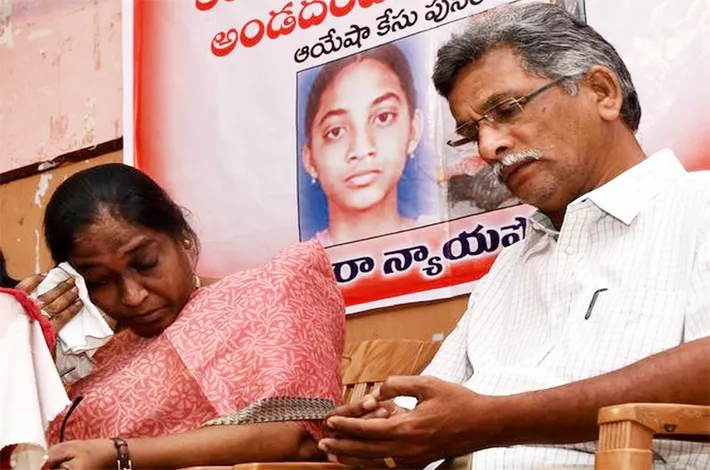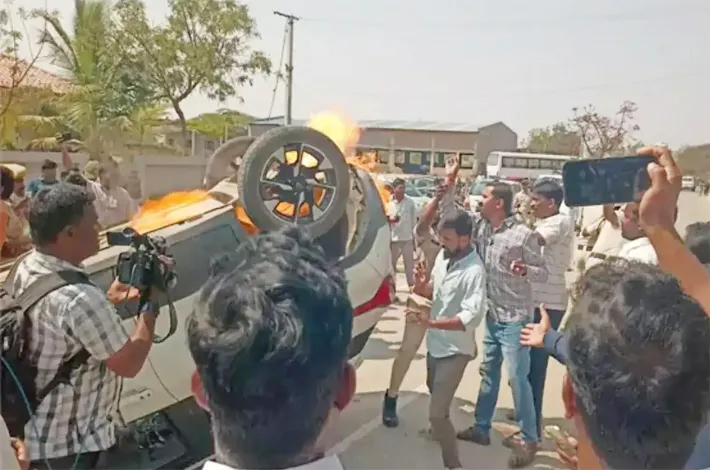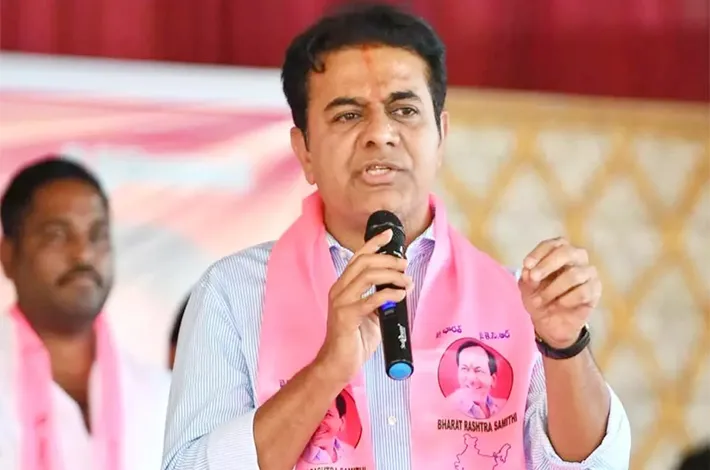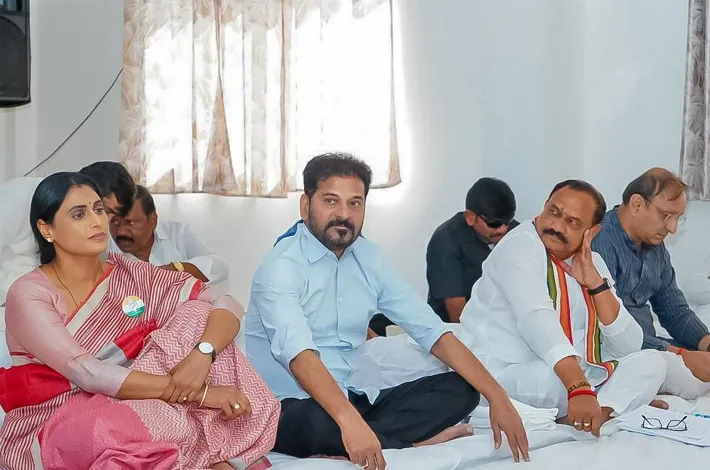‘Ram, Madhav’ to lead BJP
01-07-2025 12:00:00 AM
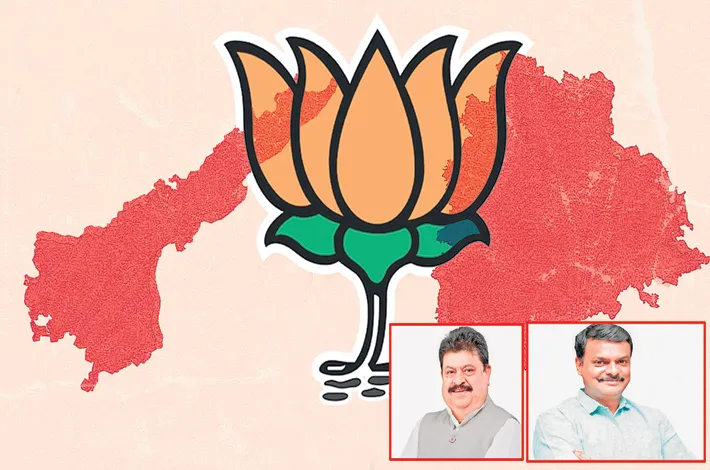
BJP’s Strategic Leadership Choices in Telangana and AP: A Long-Term Vision
■ Calculated approach to leadership appointments
■ Prioritizing long-term electoral strategy
■ Balancing community representation, fostering internal unity
■ Laying the groundwork for future electoral success
metro india news I hyderabad / amaravati
The Bharatiya Janata Party (BJP) has once again demonstrated its calculated approach to leadership appointments, prioritizing long-term electoral strategy and organizational harmony over populist pressures or mobilization skills. Unlike its rival, the Congress party, which often bends to internal power dynamics or public-facing charisma, the BJP operates on a different plane, focusing on winnability and strategic alignment. This approach is evident in its recent appointments of state unit presidents for Telangana and Andhra Pradesh, as well as in its selection of chief ministers for states like Madhya Pradesh and Rajasthan.
By choosing former MLC and senior advocate Ramachander Rao for Telangana and Madhav for Andhra Pradesh, the BJP has underscored its commitment to balancing community representation, fostering internal unity, and laying the groundwork for future electoral success.
Telangana: Ramachandra Rao’s Inclusive Leadership
In Telangana, the BJP’s decision to appoint Ramachander Rao as the state unit president reflects a nuanced understanding of the state’s complex political and social dynamics. Rao, a senior leader regarded as an “Ajatha Shatru” (a leader with no enemies) within the party, is known for his excellent rapport with senior leaders, cadre, and activists. His selection over prominent names like G. Kishan Reddy, DK Aruna, Bandi Sanjay, D. Arvind, or Etala Rajender—leaders from the influential Reddy or Backward Classes (BC) communities—signals the party’s intent to avoid factionalism and maintain internal cohesion.
‘The BJP’s leadership was acutely aware that appointing a leader from either the Reddy or BC community could alienate other senior figures within these groups, potentially creating rifts at a time when unity is paramount. Rao, however, enjoys broad acceptance across communities, particularly among Reddys and BCs, making him a unifying choice. His appointment provides the BJP with a three-year window to strengthen its organizational base in Telangana ahead of the next assembly elections. Should Rao perform well, he could secure an extension as state president. Even if the party opts for a leadership change before the polls, Rao’s reputation as a dedicated party loyalist ensures he will step aside without causing friction, a quality the BJP values in its long-term planning.
Kishan Reddy, a valuable asset
The decision also reflects the BJP’s confidence in its existing leadership pool in Telangana. For instance, G. Kishan Reddy, a towering figure in the state unit, was not chosen for the state president role, likely because the party has bigger plans for him. Kishan Reddy’s remarkable journey—from an ordinary BJP worker to national president of the Bharatiya Janata Yuva Morcha (BJYM), state president in united Andhra Pradesh and later Telangana, and a Union minister holding portfolios in Home, Tourism, and Mines—positions him as a potential candidate for the BJP’s national presidency or even as the party’s chief ministerial face in Telangana in the future.
His close ties with Prime Minister Narendra Modi, dating back to their BJYM days, and his rapport with Home Minister Amit Shah further bolster his credentials. Kishan Reddy’s ability to forge alliances with other political parties also makes him a valuable asset for the BJP’s broader electoral strategy in Telangana, where coalition-building could prove crucial.
Andhra Pradesh: Madhav’s Strategic Fit
In Andhra Pradesh, the BJP’s selection of Madhav as the state unit president is equally strategic, tailored to the state’s unique political landscape. Andhra Pradesh’s politics is heavily influenced by caste dynamics, with the Kamma and Kapu communities holding significant sway. The BJP, having previously appointed leaders from these communities to head its state unit, faced the challenge of diversifying its leadership to avoid alienating other groups. With the majority of the Reddy community aligned with the YSR Congress Party (YSRCP), the BJP turned to the Backward Classes (BC) community, selecting Madhav, a leader from the Velama caste (classified as BC in Andhra Pradesh) with a strong Rashtriya Swayamsevak Sangh (RSS) background.
Madhav’s appointment serves multiple purposes. First, it broadens the BJP’s appeal among BC voters, a critical demographic in Andhra Pradesh. Second, it ensures that the BJP’s state leadership does not pose a threat to its allies, the Telugu Desam Party (TDP) and the Jana Sena Party (JSP), with whom the BJP will likely collaborate in future elections. Madhav’s RSS roots align with the BJP’s ideological core, while his non-Kamma, non-Kapu identity avoids stepping on the toes of TDP and JSP, which draw significant support from these communities. This careful balancing act underscores the BJP’s intent to play a complementary role within the alliance while steadily expanding its footprint in Andhra Pradesh.
A Broader Strategy
The appointments of Ramachander Rao and Madhav are not isolated decisions but part of the BJP’s broader strategy to strengthen its organizational structure in southern states, where it has historically faced challenges. In Telangana, the party is banking on Rao’s ability to unify factions and build a robust grassroots network, leveraging the state’s growing disenchantment with the Congress and the Bharat Rashtra Samithi (BRS). In Andhra Pradesh, the BJP is positioning itself as a reliable ally to the TDP and JSP while appealing to underrepresented communities like the BCs. These choices mirror the BJP’s approach in states like Madhya Pradesh and Rajasthan, where chief ministerial appointments were driven by long-term electoral calculations rather than short-term populism.
The BJP’s leadership selection process highlights its discipline and foresight. By prioritizing winnability, community balance, and organizational loyalty, the party ensures that its state units are led by figures who can deliver results without destabilizing internal dynamics. Ramachander Rao’s inclusive leadership in Telangana and Madhav’s strategic fit in Andhra Pradesh exemplify this approach, setting the stage for the BJP to make significant inroads in these states. As the party prepares for future elections, its ability to execute such calculated strategies will be key to its ambition of becoming a dominant force in southern India.
N Ramchander Rao
N Ramchander Rao’s ideological evolution was shaped largely by his formative years at Osmania University (OU) where he began his journey in the politically charged atmosphere of Osmania University—often referred to as the cradle of student movements in South India. Born into a Brahmin family, Ramchander Rao grew up on the OU campus, where his father was a professor. Despite a background that was generally distant from political agitation, Rao gravitated toward activism during his college days, aligning with the Akhil Bharatiya Vidyarthi Parishad (ABVP).
At a time when radical left student groups held sway over campus politics, Rao stood out as a fearless ABVP leader. He served as ABVP president in Railway Degree College between 1977 and 1980, a period marked by intense ideological clashes with radical student outfits.
His defiance cost him dearly—he was once brutally attacked by Naxalite sympathizers inside the OU library, resulting in serious injuries that left him bedridden for two months. Still, he returned undeterred, continuing his battle against left-wing dominance in student politics. He completed B.A., followed by an M.A. (1980–82) and an LL.B. (1982–85), all while actively participating in student and political activities.
Legal Crusader
Ramchander Rao began practicing law in 1986, making a mark in criminal, civil, and constitutional cases across Hyderabad’s courts and eventually in the High Court and Supreme Court. In 2012, he was designated as a Senior Advocate by the High Court—a recognition of his legal acumen and stature in the field. His unwavering legal support to the party made him a go-to advocate for BJP’s legal battles in Telangana and Andhra Pradesh.
Political Rise in the BJP
Rao's political career within the BJP formally began in the mid-1980s. He first contested as a corporator from Ravindra Nagar division and rose through the ranks with steady dedication. His roles included:
BJYM State Secretary (1980–82)
Hyderabad City Vice President (1986–90)
BJP State Legal Cell Convener (2003–06)
National Joint Convener of BJP Legal Cell (2006–10)
BJP State Spokesperson and later Chief Spokesperson
BJP State General Secretary (2009–12)
In 2015, he was elected as a Member of Legislative Council (MLC) from the Hyderabad-Ranga Reddy-Mahabubnagar Graduates Constituency and served until 2021, acting as the BJP floor leader in the Council. He also served as BJP Hyderabad City President, enhancing the party’s visibility in the state capital.
Ramchander Rao is widely known within the BJP circles as a "connecting leader"—approachable, affable, and respected across generations of party workers. Reward for loyalty Ramchander Rao’s appointment as BJP Telangana President is being viewed as a signal from the central leadership that the party rewards loyalty, consistency, and ideological clarity.
PVN Madhav
Pokala Vamsi Nagendra Madhav (PVN Madhav)'s elevation as the BJP’s Andhra Pradesh state president marks a calculated shift towards ideological steadiness and grassroots credibility. A loyal swayamsevak with deep organisational roots and legislative experience, Madhav’s rise is being viewed as a central leadership decision that values long-standing commitment over political flamboyance.
Born on August 10, 1973, in a family steeped in Sangh ideology, Madhav’s political journey began not in the corridors of power, but in the training camps of the Rashtriya Swayamsevak Sangh (RSS). His father, PV Chalapathi Rao, twice served as MLC from Visakhapatnam Graduates’ Constituency and was among the early RSS functionaries in Andhra Pradesh. Following in his father’s ideological footsteps, Madhav began as a swayamsevak and rose through the ranks to become RSS Visakhapatnam City Secretary.
He pursued his academics at Dr. V.S. Krishna Government College and Andhra University, completing B.Com, Cost Accountancy, and MBA, along with postgraduate diplomas in computing and statistics. But even during his student days, his political grounding deepened with the Akhil Bharatiya Vidyarthi Parishad (ABVP), where he served as State Joint Secretary.
Madhav was not just an occasional activist — he committed himself full-time to the Swadeshi Jagaran Manch, advocating for indigenous industry and organizing national-level Swadeshi campaigns.
His profile expanded through the BJP youth wing (BJYM) where he served as State General Secretary (2006–2010) and later as National Secretary (2010–2013). During this period, Madhav gained prominence as an activist in Visakhapatnam, spearheading movements on issues like land encroachments, SEZ displacements, electricity tariff hikes, and the demand for a special railway zone.
In 2017, Madhav was elected as MLC for North Coastal Andhra Graduates’ Constituency, and subsequently served as BJP Floor Leader in the Andhra Pradesh Legislative Council until 2023. He currently serves as Chairman of Coromandel Fertilizers Ltd, maintaining ties with industry while continuing as a key party strategist.
In the run-up to the appointment, several names were floated — from Sujana Chowdary to Kiran Kumar Reddy and Somu Veerraju — but the BJP high command went with a less controversial, more grounded choice. Madhav’s elevation is being seen as a message to party karyakartas: commitment to ideology and organisation will be rewarded.
Profile: PVN Madhav
Born: August 10, 1973
Education: B.Com, Cost Accountancy, MBA (Andhra University); PGDCS, PGDAS
RSS Roles: Visakhapatnam City Secretary, State Executive Member
ABVP: State Joint Secretary
BJYM: State General Secretary (2006–2010), National Secretary (2010–2013)
MLC: North Coastal Andhra (2017–2023), BJP Floor Leader
Other Roles: Chairman, Coromandel Fertilizers Ltd; Former State BJP General Secretary





